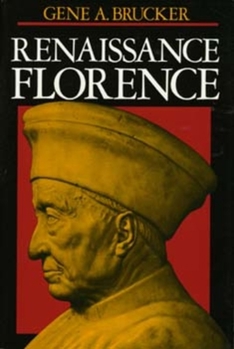Renaissance Florence, Updated Edition
Select Format
Select Condition 
Book Overview
In the fourteenth and fifteenth centuries, the city of Florence experienced the most creative period in her entire history. This book is an in-depth analysis of that dynamic community, focusing primarily on the years 1380-1450 in an examination of the city's physical character, its economic and social structure and developments, its political and religious life, and its cultural achievement. For this edition, Mr. Brucker has added Notes on Florentine...
Format:Paperback
Language:English
ISBN:0520046951
ISBN13:9780520046955
Release Date:April 1983
Publisher:University of California Press
Length:320 Pages
Weight:0.86 lbs.
Dimensions:0.8" x 5.5" x 8.2"
Customer Reviews
4 ratings
Concise yet informative scholarship
Published by Thriftbooks.com User , 16 years ago
This book is very concise, yet deeply informative. I am a PHD student in early modern europe, and I must say the person disgruntled about the lack of artistic discussion is a bit misinformed about Renaissance Italy. Art was not the only phenomenon coming out of Renaissance Italy. It consist of much more, and the humanistic side helped develop Florence on an economic/ political level that was very important. Whereas art appears to be the central them to the Renaissance, it is not. The book is well written, easy to follow, and is interesting. If you are looking for something more artistic, look for something published by an art historian. Brucker does a good job hitting a variety of points. One must remember that the book is looking at FLorence during the Renaissance, not art alone. Major political changes occurred, etc. If you are looking for a text that discusses Italian politics during the Renaissance in more detail I would suggest a book by Daniel Waley titled The Italian City-Republics. This is a great book for Renaissance history courses, but also is done well enough that the non-specialists can easily follow. If you want a book that solely focuses on the artistic side of Renaissance Florence/Italy I would suggest Frederick Hartt's History of Italians Renaissance Art.
Portrait of the Golden Age of Florence
Published by Thriftbooks.com User , 19 years ago
This book chronicles the golden age of Florence, from the 1300's through the 1500's. Brucker does an excellent job of using the ample primary source materials located in Florence itself: his text is chock full of merchant's account books, diplomatic letters and funeral arrangements. His treatment compares favorably with Hibberts book on the Medici, which covers much the same ground but with little or no use of primary sources. At the same time, the tone of the book is conversational. Brucker doesn't let his sources get in the way of readability. This book is one of Norman F. Cantor's "Core 150" books on Midevial studies and Cantor himself edited it as part of the "Historical Cities" collection. Although "Renaissance Florence" was written in the mid 60's, it still feels vibrant and up to date. I think this quality is attributable to his reliance on primary, rather then secondary source material. "Renaissance Florence" is broken into six chapters: the renaissance city, the economy, the patricate, politics, the church and the faith and culture, with an epilogue "the last years of the republic". This approach provides a cohesive portrait of the Florentian golden age without unduly emphasizing the painting and sculpture of the fiftteenth century. I found the sections on the economy and politics more interesting then the section on culture, which is a testament to Mr. Brucker's fine scholarship.
excellent overview of Renaissance Florence
Published by Thriftbooks.com User , 24 years ago
Picking up a book on Renaissance Florence, you would expect to get a book almost solely devoted to art and culture. However, this book is fascinating in its analysis of all aspects of life in Renaissance Florence. Covering the period between about 1300 and 1500, Brucker divides the book into six subjects, including the economy, politics and the church. Through a lot of use of contemporary (and unpublished) documents, Florence comes across as a pretty chaotic place, with 40 religious holidays per year, public executions, workers' riots, plagues, wars with Milan and Naples plus a booming population (the fifth largest in Europe at the time). How a huge cultural revolution emerged from all of this seems like a miracle, but Brucker argues that it was the confluence of several factors: the even influence of the Greco-Roman-Christian tradition and the vernacular tradition, being stuck between feudalism and capitalism, the flexible social structure and, last but not least, Dante.Brucker also traces the decline of Florence in the late 1400s and early 1500s as the city grew conservative and public patronage of the arts declined with the rise of the Medicis. Finally, he does devote a good chunk of the book to describing the achievements of Giotto, Michelangelo et al., making this an important read for any student of the Renaissance.
Delightful!
Published by Thriftbooks.com User , 24 years ago
Gene Brucker sets new standards for World Historians! When you think about your purchases, think very hard before you walk away, so to speak, without a copy of Renaissance Florence. 'Cause if you do, you'll leave with a hole in your spiritual and cultural life.





